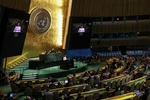Expert: BiH Constitutional Court could review High Representative's decision

International community’s High Representative Christian Schmidt will impose technical changes to the BiH Election Law on Wednesday afternoon, regarding the integrity of the election process, while the other measures he intended to declare using the Bonn powers will remain pending. If in the end, he decides on the measures that have been rumoured for days, "he will return the country back to the time of 1995-2000 when the three large ethnic parties of Bosniaks, Croats and Serbs had a quasi-monopoly in representing the people of BiH", said Joseph Marko, an expert in constitutional law and one of three international judges in the Constitutional Court of Bosnia and Herzegovina from 1997 to 2002.
Oglas
The expert noted that it is difficult to speculate about the real intentions of the High Representative in Bosnia and Herzegovina. It is questionable, he stated, whether the amendments to the Election Law will have a real effect on what is presented as the official intention - preventing the blocking of the work of institutions in the Federation entity (FBiH).
He added that it is difficult to change the Law just two months before the election and that the High Representative's assessment is questionable, regarding the fulfilment of conditions from Annex 7 of the Dayton Peace Agreement - so the basis for the Election Law no longer has to to be the census from 1991, but the last one from 2013.
In his opinion, the effect of the threshold percentage of three percent will be such that the electoral strongholds of major parties, especially the Croat Democratic Union (HDZ BiH), will be further strengthened.
According to him, the danger of this provision will be that one party will get a quasi-monopoly in the future, on determining who will be elected or appointed as a representative of certain constituent peoples.
This means that this provision in the Draft Election Law will return Bosnia and Herzegovina back to the time of 1995-2000 when the three big ethnic parties of Bosniaks, Croats and Serbs had a quasi-monopoly in representing the people, Joseph Marko said.
The expert explained that this problem can be forwarded to the Constitutional Court of Bosnia and Herzegovina for assessment.
"The European Court of Human Rights has already decided in the case "Beric v. BiH" that the judicial review of the High Representative's decisions in the area of imposition of legislation does not violate his mandate in accordance with the Dayton Agreement, so it is possible to submit a request to the Constitutional Court of BiH and request revision of the High Representative's decision because this has already been done in the past. The case was the Law on Border Policy imposed by High Representative Wolfgang Petritsch, which ended up on judicial review. That would be a certain type of check before the institutions of BiH. Then it would be up to the highest judicial instance in BiH to decide whether to consider such a request possible or not," he concluded.
Kakvo je tvoje mišljenje o ovome?
Učestvuj u diskusiji ili pročitaj komentare
Oglas
Kakvo je tvoje mišljenje o ovome?
Učestvuj u diskusiji ili pročitaj komentare
Oglas
NAJČITANIJE
Oglas
Oglas
Najnovije
Oglas
Oglas





 Srbija
Srbija
 Hrvatska
Hrvatska
 Slovenija
Slovenija



























































